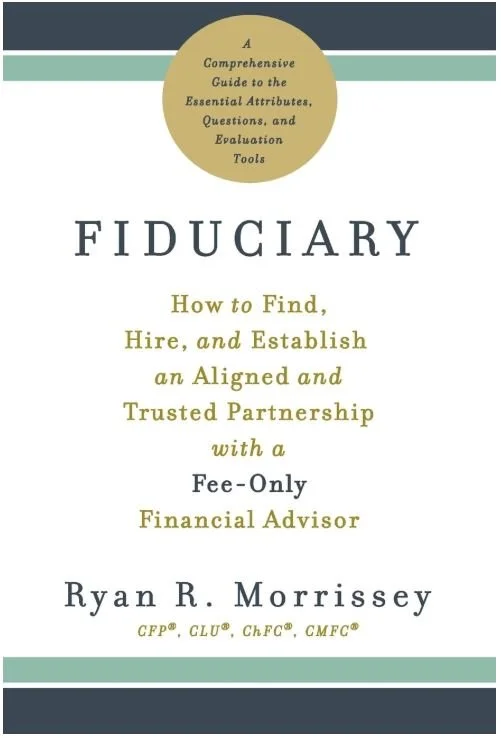10 Interview Questions to Ask When Hiring a Financial Advisor
One of the most important financial decisions you’ll ever make is choosing the right financial advisor. Whether you're looking to hire someone new or already working with an advisor, it’s critical to ask the right questions to ensure you’re getting advice that’s in your best interest.
Despite the financial industry’s efforts to protect investors, I still come across far too many stories of people receiving poor advice—or worse, falling victim to outright theft. As a consumer, you need to be your own advocate. The 10 questions I’m about to share will help equip you with the knowledge to avoid scams and poor recommendations.
1. Are You a Fiduciary and Fee-Only Firm?
A fiduciary is legally and ethically obligated to put your interests ahead of their own. Think of it like going to a doctor who examines you thoroughly before making a recommendation—not one who pushes a procedure just because they’re getting a kickback.
Some advisors operate under a “suitability” standard, meaning their advice only needs to be “suitable”—not necessarily best—for you. Fee-only advisors, on the other hand, don’t receive commissions for selling products or managing portfolios. This greatly reduces conflicts of interest.
You can verify an advisor’s regulatory status by reviewing their ADV form on adviserinfo.sec.gov. I’ll link my firm’s ADV in the blog post for reference.
2. Do They Have Any Disclosures or Complaints?
If an advisor has a history of complaints or regulatory issues, that information is publicly available. A single disclosure might not be a deal breaker, but multiple incidents should be a red flag.
Use tools like:
Advisor Info on SEC.gov
3. What Certifications Do You Hold?
While passing the Series 65 exam allows someone to become a fee-only advisor, it’s a relatively low barrier. I strongly recommend working with someone who holds the Certified Financial Planner™ (CFP®) designation. Becoming a CFP® requires years of study, passing a comprehensive 10-hour exam, and demonstrating real-world experience.
To find a CFP® professional near you, visit cfp.net.
4. What Are Your Specialties and What Services Do You Offer?
Every advisor has a niche. For example, my specialty is retirement planning, especially for individuals within five years of retirement. Our services include:
Comprehensive financial planning
Ongoing wealth management
Other advisors may focus on divorce, education funding, or tax planning. Make sure their focus aligns with your needs.
5. How Are You Compensated?
Transparency is key. We offer:
Flat fees for financial planning
Percentage-based fees for ongoing portfolio management
Fee structures can vary widely, so understand what you're paying for and how much it will cost you over time.
6. What Other Charges Will I Incur?
As fiduciaries, we aim to minimize investment costs. We build portfolios primarily using low-cost ETFs, with an average internal cost of just 0.10%.
We also use custodians like TD Ameritrade, which typically do not charge trading or account fees for many ETFs. Always ask about fund fees, trading costs, and account maintenance fees—they add up quickly.
7. What Is Your Investment Philosophy?
We believe in low-cost, passive investing and focus on asset allocation tailored to each client’s needs. While we don’t try to time the market, we may make tactical adjustments when opportunities arise.
Ask any prospective advisor whether they believe in active management, indexing, or a hybrid approach, and request past performance data if available.
8. Where Will My Money Be Held?
To avoid fraud, your money should always be held by an independent third-party custodian, not your advisor directly. Bernie Madoff’s Ponzi scheme succeeded because he held client assets himself.
We use TD Ameritrade as our custodian, and clients receive independent statements, can log in anytime, and receive quarterly performance reports.
If an advisor asks you to write a check to them personally, walk away.
9. How Often Will We Communicate?
Our standard is to meet with clients twice a year—once in the spring and again in the fall. These sessions help update financial plans, review portfolios, and discuss tax planning opportunities. Of course, we’re available any time in between as needed.
Find out your advisor’s schedule and ensure it works for you.
10. How Long Have You Been Practicing, and How Many Clients Do You Serve?
Experience and capacity matter. I’ve been doing this since 2001, and I currently advise just over 100 families. This allows me to deliver personalized service and attention.
If an advisor is serving hundreds of clients without a team, they may not have the bandwidth to give you the support you deserve.
Closing Thoughts
Hiring a financial advisor is a big decision, and these questions will help you make an informed choice. I recommend printing them out and bringing them with you when interviewing potential advisors.
And don’t forget to do your homework—use BrokerCheck and the SEC advisor search tools to look up their background, credentials, and disclosures.
If you have a question or topic that you’d like to have considered for a future episode/blog post, you can request it by going to www.retirewithryan.com and clicking on ask a question.
As always, have a great day, a better week, and I look forward to talking with you on the next blog post, podcast, YouTube video, or wherever we have the pleasure of connecting!
Written by Ryan Morrissey
Founder & CEO of Morrissey Wealth Management
Host of the Retire with Ryan Podcast



